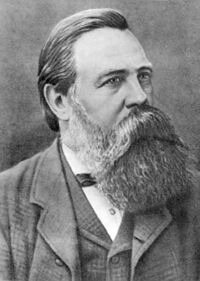m 1 revision imported |
No edit summary |
||
| Line 1: | Line 1: | ||
{| class="wikitable" style="float:right;" | |||
! colspan="2" | {{{subj|Friedrich Engels}}} | |||
|- | |||
! colspan="2" | [[File:{{{img|Engels}}}.{{{format|jpg}}}|{{{width|200px}}}]] | |||
|- | |||
| colspan="2" style="text-align: right" | <small>{{{capt|Friedrich Engels}}}</small> | |||
|- | |||
! Born | |||
| {{{born|November 28, 1820}}} | |||
|- | |||
! Place of birth | |||
| {{{place|Germany}}} | |||
|- | |||
! Known for | |||
| {{{known|Scientific Socialism}}} | |||
|} | |||
=Biography= | =Biography= | ||
Revision as of 14:30, 28 August 2023
| Friedrich Engels | |
|---|---|

| |
| Friedrich Engels | |
| Born | November 28, 1820 |
| Place of birth | Germany |
| Known for | Scientific Socialism |
Biography
Friedrich Engels was a prominent figure in the 19th century, known for his significant influence on philosophy, social theory, and political thought. Born in Germany in 1820, he collaborated closely with Karl Marx, and together they developed the Scientific Socialism and Dialectical Materialism that would become the foundation of Marxism. Engels' contributions to understanding class dynamics, historical materialism, and the critique of capitalism were instrumental in shaping the trajectory of socialist and communist movements. He also played a crucial role in documenting the realities of working-class life during the Industrial Revolution through his investigative works. Engels' writings, often in partnership with Marx, have left an enduring impact on fields such as economics, sociology, and political theory.
Works
We Provide The Complete Works of Marx and Engels.